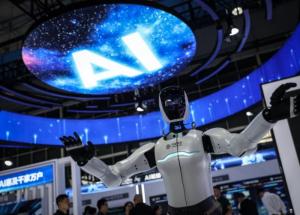Liaoning Accelerates Smart Manufacturing with Digital Intelligence

The main venue of the 2025 Global Industrial Internet Conference in Shenyang, Liaoning Province. Photo provided by Industrial Internet Conference.
Liaoning showcased rapid industrial upgrades at the 2025 Global Industrial Internet Conference, with digital intelligence fueling smart, green growth.
SHENYANG, CHINA, September 16, 2025 /EINPresswire.com/ -- Liaoning Province, once best known as a heavy-industry hub, is moving rapidly into a new era of digital intelligence and smart manufacturing. At the 2025 Global Industrial Internet Conference held in Shenyang, the province showcased how data and innovation are reshaping its industrial landscape.In recent years, Liaoning has accelerated the rollout of smart factories and digital workshops, aiming to build a greener, more efficient industrial system. The results are already visible: 50.8 percent of production equipment in the province is now digitally connected. A total of 469 provincial-level digital workshops and 238 advanced smart factories have been established, and eight companies have earned national recognition for excellence.
From Legacy Base to Digital Pioneer
Liaoning has long been seen as a traditional manufacturing base, but that reputation is changing. The province is harnessing digital technologies to upgrade old industries, streamline supply chains, and reduce environmental pressure. At the conference, experts discussed the fast pace of industrial-internet innovation and the need to rebuild industrial ecosystems with smarter, more connected systems.
The push is guided by a simple idea: use data to empower production and intelligence to drive decision-making. That means production lines equipped with sensors, workshops linked by real-time platforms, and managers who can make decisions based on accurate digital models rather than trial and error.
Smart Factories in Action
The transformation is most visible on factory floors. Smart factories in Liaoning use robotics, artificial intelligence, and advanced control systems to manage complex operations. Machines now report their own performance, adjust to changes in production, and even predict when maintenance is needed. This not only improves efficiency but also reduces waste and energy use.
At the exhibition halls of the conference, visitors saw industrial robots and intelligent operating systems at work. These technologies are not only automating repetitive jobs but also enabling more flexible and adaptive manufacturing, with robots and humans working side by side.
Revitalizing Traditional Industries
Liaoning’s digital drive goes well beyond new technologies; it is breathing new life into traditional industries.
In Haicheng, the magnesite industry has abandoned resource-heavy development in favor of integrated, efficient, and environmentally friendly production.
In Anshan, once dominated by conventional steelmaking, plants have introduced real-time monitoring and fully digitized control systems. Entire production lines now operate under numerical control, improving product quality and cutting energy costs.
In Dalian, apparel companies are using digital platforms to turn customized suit-making into large-scale production. Automated tailoring systems connected to customer data make it possible to deliver bespoke clothing quickly and efficiently.
These examples highlight how even long-established sectors are finding new competitive advantages through digital intelligence.
Building a New Ecosystem
What makes Liaoning’s approach stand out is its focus on creating an industrial ecosystem rather than isolated upgrades. Factories, research institutes, and technology developers are working together to accelerate innovation and share solutions. Universities and research centers provide new technologies, while enterprises put them into practice.
Digital platforms are connecting suppliers, manufacturers, and customers, so that production, logistics, and sales can be coordinated in near real time. This approach ensures that innovation spreads quickly across industries instead of staying confined to pilot projects.
Toward Greener, Smarter Growth
Efficiency and sustainability are at the heart of Liaoning’s shift. Smart systems track energy consumption, minimize downtime, and flag inefficiencies, helping companies cut their carbon footprint. These improvements align with national goals of developing a greener economy while boosting industrial competitiveness.
The changes also give Liaoning companies an edge in international markets. Factories that can demonstrate higher levels of traceability, quality, and responsiveness are better placed to win contracts and attract investment.
Looking Ahead
The 2025 Global Industrial Internet Conference underlined Liaoning’s determination to keep pushing forward. The province is expected to expand digital connectivity to more equipment, apply artificial intelligence more deeply in production planning, and link more small and medium-sized firms into smart supply chains.
With nearly half of its production equipment already online, hundreds of digital workshops in operation, and a growing number of nationally recognized smart factories, Liaoning is laying the groundwork for long-term growth. From steel to clothing, robots to petrochemicals, the province is proving that even the oldest industries can reinvent themselves with data and intelligence at the core.
Mary
I-POWER
email us here
International participants interviewed during the 2025 Global Industrial Internet Conference. Photo provided by the Global Industrial Internet Conference.
Legal Disclaimer:
EIN Presswire provides this news content "as is" without warranty of any kind. We do not accept any responsibility or liability for the accuracy, content, images, videos, licenses, completeness, legality, or reliability of the information contained in this article. If you have any complaints or copyright issues related to this article, kindly contact the author above.


